
November 2018
Author Scott Page to Present Keynote Address at Annual Conference
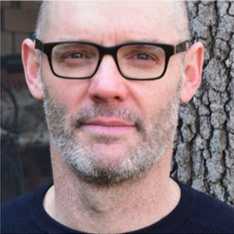 Leading social scientist and author Scott Page will present a keynote address at the 2019 AAVMC Conference and Iverson Bell Symposium in Washington, D.C. March 8-10, 2019.
Leading social scientist and author Scott Page will present a keynote address at the 2019 AAVMC Conference and Iverson Bell Symposium in Washington, D.C. March 8-10, 2019.Registration is now open for the AAVMC’s 2019 Annual Conference , which will be presented at the Hyatt Regency Washington on Capitol Hill.
Themed “The Science of Building Inclusive Teams,” the meeting will explore strategies and benefits from incorporating appropriate levels of diversity and inclusiveness in working groups and teams.
Page is one of the world’s leading experts on improving collective performance and decision-making through diversity. His new book “The Model Thinker: What you Need to Know to Make Data Work for You” is due out November 27, 2018.
Other titles he has authored include “The Difference: How the Power of Diversity Creates Better Groups, Firms, Schools and Societies” and “The Diversity Bonus: How Great Teams Pay Off in the Knowledge Economy.”
Page’s key insight, as summarized in his official biographical materials: “Groups made up of intelligent people who are inwardly diverse – that is, who have different perspectives, mindsets and ways of solving problems – can make more accurate predictions and solve problems more effectively than groups of ‘experts.’”
Page is the Leonid Hurwicz Collegiate professor of Complex Systems, Economics and Political Science at the University of Michigan. He is also affiliated with the Sante Fe Institute, a world-renowned research center dedicated to using complexity science to solve human problems.
The AAVMC’s annual conference is considered one of the leading professional development events in international academic veterinary medicine. Hundreds of leading educators and leaders from the veterinary medical profession are expected to gather for the three-day forum. The AAVMC’s annual complement of recognition awards for professional excellence and service will be presented.
Register by December 31, 2018 to take advantage of early registration incentives. For more information, contact Leslie Wilson at lwilson@aavmc.org.
AAVMC’s Greenhill, Illinois’ Constable Present Educational Perspective at AVMA Economics Symposium
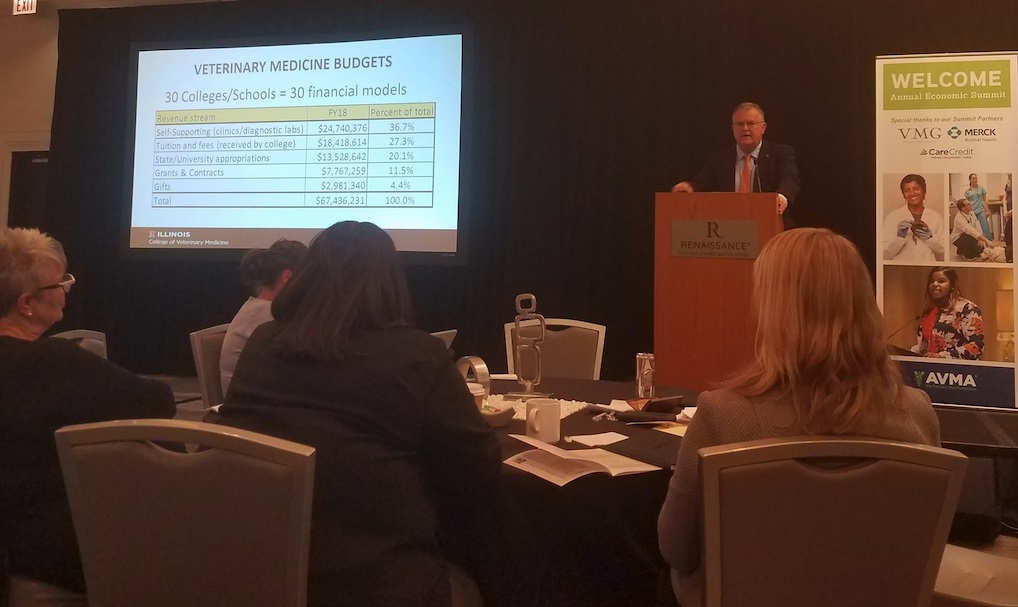
University of Illinois College of Veterinary Medicine Dean Dr. Peter Constable addresses the AVMA Economic Summit.
A series of programs were presented within the general categories of Setting the Stage – The Economy and Economic Projections, the Market for Veterinary Education, Veterinary Practice, The Market for Veterinarians, and The Market for Veterinary Services.
Comments and forecasts were generally consistent with the present uptick in the overall economy, which has fostered a strong hiring market for veterinarians and solid consumer spending for clinical services. However, persistent problems such as tuition costs, educational debt and a troublesome debt-to-income ratio among graduates remain problematic.
Academic veterinary medicine was represented during presentations made by AAVMC Senior Director for Institutional Research and Diversity Dr. Lisa Greenhill and University of Illinois College of Veterinary Medicine Dean Dr. Peter Constable.
During her presentation, Greenhill shared insights regarding the applicant pool and financial literacy gleaned from her primary and secondary research.
She said the applicant-to-seat ratio continues a slow climb upward. The ratio of the newest group of applicants is projected to be 1:1.91, which is highest the ratio has been in more than 10 years. Racial and socioeconomic diversity in the applicant pool is growing, but the percentage of men in the applicant pool continues to fall, with only 15 percent of applicants to the class of 2022 identifying as male.
Applicants do consider the full cost of attendance in deciding which colleges to apply to, however the cost of attendance is not a decision driver, it is merely a consideration. Other considerations include perceptions in seat availability, program offerings and perceptions about their own competitiveness in the applicant pool.
The cost of a DVM education is not truly considered, Greenhill explained, until applicants have an offer of admission; then cost becomes a decision driver for applicants who are holding two or more offers of admission. Forty percent of the pool only receive one offer, so cost diminishes in importance. Much more of the applicant pool’s diversity falls into this 40 percent group.
She concluded that financial education programs geared toward timely and goal specific decision-making have a greater chance of influencing financial decision-making.
Constable provided thoughts from the perspective of a college dean during his presentation.
He told the group that there is a wide variety of budget models used by colleges and universities, which makes it difficult to make comparisons, but he shared some observations from his own experiences.
There is quite a bit of variability in how much of a college’s tuition revenue may be a part of the college’s budget. Generally, he said, not all of that revenue goes to the college, as is the case at the University of Illinois where tuition makes up less than 30 percent of the college’s budget.
Persistent cuts in higher education have made colleges much more lean and efficient out of necessity; the cuts have also driven innovation in the pursuit of more college-based, self-generating revenue. Dr. Constable shared examples of several online programs the college is using to provide both courses and professional development for students and practitioners.
With respect to buildings and capital projects, he said it is generally rare for tuition streams to be used for building construction.
Three AAVMC Members Earn Diversity HEED Award
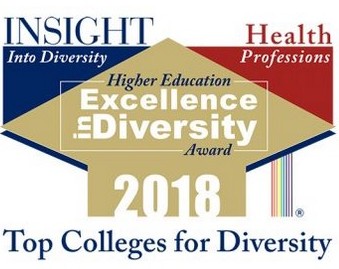 Three AAVMC member institutions have been awarded the 2018 Health Professions Higher Education Excellence in Diversity (HEED) Award. The prestigious award recognizes excellence in programs designed to create greater diversity and inclusion.
Three AAVMC member institutions have been awarded the 2018 Health Professions Higher Education Excellence in Diversity (HEED) Award. The prestigious award recognizes excellence in programs designed to create greater diversity and inclusion.Honorees include colleges of veterinary medicine at Michigan State University, Texas A&M University and The Ohio State University. The Texas A&M College of Veterinary Medicine and Biomedical Sciences and The Ohio State University College of Veterinary Medicine were also recognized with the honor last year.
“We congratulate these colleges for earning this prestigious award,” said AAVMC Chief Executive Officer Dr. Andrew T. Maccabe. “The honor achieved by these three members also reflects the commitment all of our members have to building diversity and inclusion on campus, and in turn fostering institutional excellence.”
The award, which is open to all colleges and universities of the health professions across the U.S. and Canada, is based upon a comprehensive assessment of an institution’s level of achievement and intensity of commitment regarding efforts to broaden diversity and inclusion on campus. Judges examine a range of programs and initiatives, including outreach, student recruitment, retention, and completion; and hiring practices for faculty and staff.
It includes medical, dental, pharmacy, osteopathic, nursing, veterinary, allied health, and other health schools and centers, with a total of 35 institutions receiving awards.
HEED Award administrators say one of the goals of the application process is to help institutions of higher education assess their diversity efforts in a way that helps them recognize and build upon their success and identify opportunities for improvement.
The award is judged by representatives of Potomac Publishing, Inc., publisher of INSIGHT Into Diversity magazine, as well as members of the INSIGHT Into Diversity Editorial Board members and members of the Health Professions HEED Award Advisory Board. INSIGHT Into Diversity is the oldest and largest diversity-focused publication in higher education.
Veterinarians in the National Academy of Medicine: A Developing Opportunity
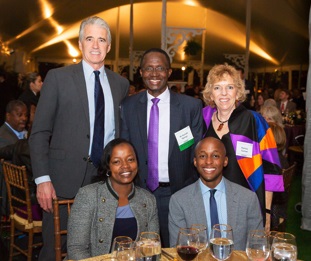
Dr. M. Kariuki Njenga’s National Academy of Medicine induction ceremony was held in October 2018 in Washington, D.C. NAM veterinarian members pictured include, from left, Dr. Guy Palmer, Washington State University; Dr. Njenga; and Dr. Patricia Conrad, University of California – Davis. Front row: guests.
The National Academy of Medicine is part of the National Academies of Sciences, Engineering and Medicine. Established in 1863 during the Lincoln administration as the National Academy of Sciences, the non-profit, private organization exists to provide expert advice and counsel on scientific matters for the federal government and others.
Over the past 150 years, the organization has evolved to include the National Academy of Engineering, the National Academy of Medicine, and the National Research Council. Its membership includes more than 300 Nobel laureates.
Of the 2,131 current members of the National Academy of Medicine, 23 are veterinarians.
Given the fact that veterinarians contribute so profoundly to human health and wellbeing, there is a case to be made that more could be included within the ranks of the NAM, according to Dr. Michael D. Lairmore, dean of the University of California – Davis School of Veterinary Medicine and AAVMC President–Elect.
“The National Academy of Medicine seeks to promote evidence-based scientific data to guide our nation,” said Lairmore, who was elected to the NAM in 2010. “The training veterinarians receive, guided by high quality educational standards of our AAVMC member institutions, positions our profession to contribute to this mission through committee work, commissioned reports, and elected membership.”
The newest veterinarian in the National Academy of Medicine is Dr. M. Kariuki Njenga, professor of epidemiology and virology, Paul Allen School for Global Animal Health and Country Director of Washington State University Global Health-Kenya. He was inducted in October.
To see a list of living veterinarians who are members of the National Academy of Medicine and a fact sheet regarding the nomination and induction process compiled by Dr. Lairmore, please click here.
CIVME Conducts Fall Meeting at University of Utrecht
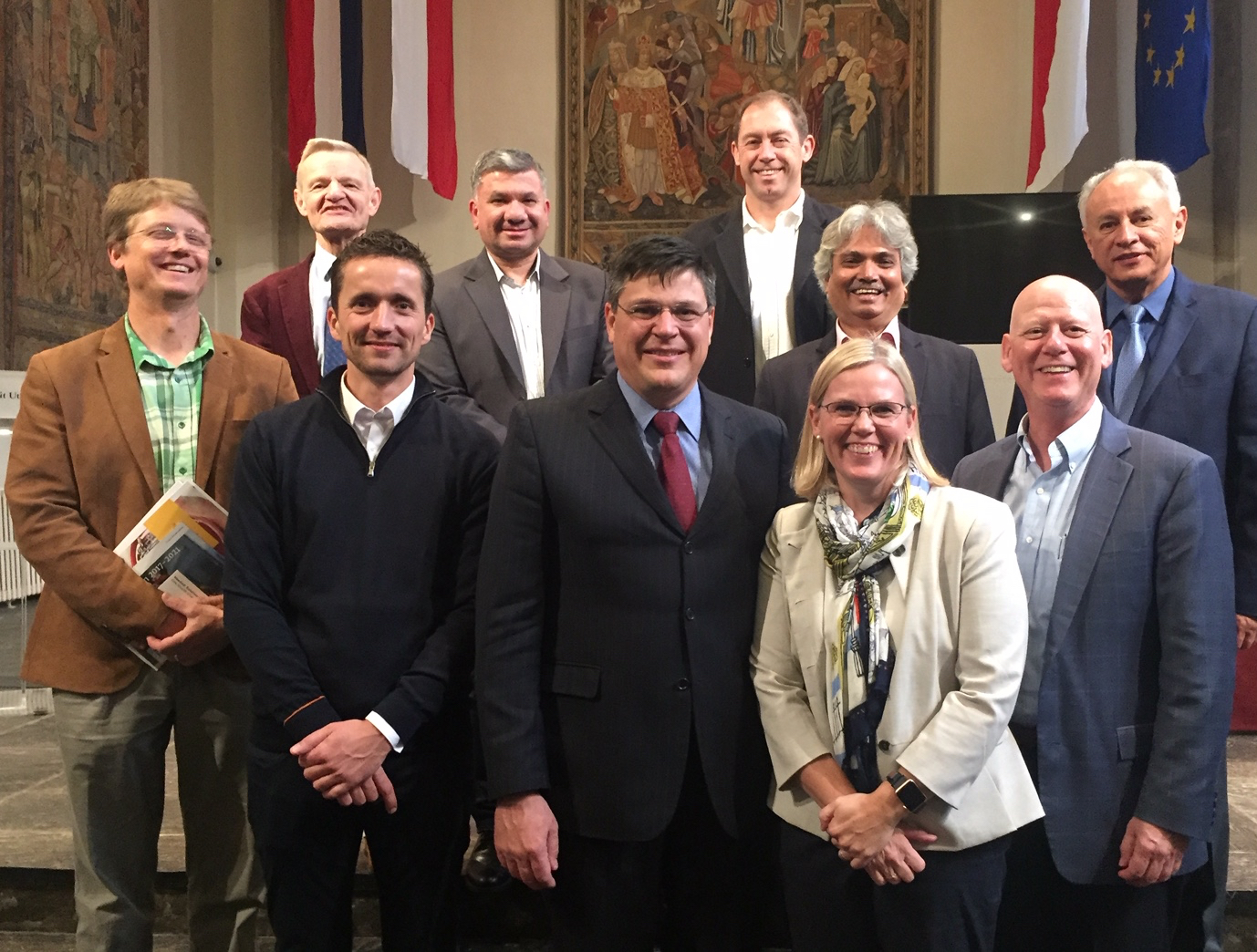
CIVME leaders gathered for a meeting at the University of Utrecht in The Netherlands.
The AAVMC Board of Directors provided CIVME with three years of operational funding in early 2016. The board conducted an in-depth review of CIVME’s programs during the October 2018 board meeting in Washington and is currently evaluating next steps.
During the Utrecht meeting, CIVME leaders agreed to prepare a funding proposal for the board to consider and discussed other funding options from external organizations that are also interested in elevating the quality of academic veterinary medicine in areas of the world that do not require professional accreditation for veterinary medicine.
The group held broad discussions on the benefits and complexities of international accreditation programs in veterinary medicine and made plans to announce their next round of research grant proposals. They also discussed the possibility of presenting a CIVME oriented research in education workshop in association with the AAVMC’s annual conference in March 2019.
Other discussions centered on committee governance and leadership roles, the possible development of a monthly webinar series focused on issues that are important in international academic veterinary medicine and a monograph series.
Programs at Five AAVMC Institutions Funded by VSGP
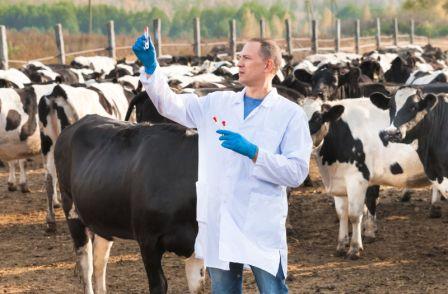 Four AAVMC member institutions and one affiliate are among the universities funded during the most recent distribution of Veterinary Service Grants Program (VSGP) Awards. Those include the University of Georgia, Iowa State University, Texas A&M University, Michigan State University, and Pennsylvania State University (affiliate).
Four AAVMC member institutions and one affiliate are among the universities funded during the most recent distribution of Veterinary Service Grants Program (VSGP) Awards. Those include the University of Georgia, Iowa State University, Texas A&M University, Michigan State University, and Pennsylvania State University (affiliate).The National Institute of Food and Agriculture (NIFA) recently announced 14 grants, including seven Education, Extension and Training grants and seven Rural Practice Enhancement grants to help mitigate veterinary service shortages in the United States.
This program is designed to support education and extension activities that enable veterinarians, veterinary students, and veterinary technicians to gain specialized skills and practices. The Agricultural Act of 2014 authorized the establishment of the VSGP as a companion to the Veterinary Medical Loan Repayment Program to incentivize service in areas underserved by veterinarians. Ultimately, VSGP will bolster the capacity of private veterinary practitioners to provide food animal veterinary services in rural areas.
Admissions and Recruitment Committee Reorganized
 The AAVMC’s board of directors approved a major reorganization of the Admissions and Recruitment Committee (ARC) during their October meeting. The ARC now includes an ARC Strategic Group, an Operations Working Group, and an Outreach & Recruitment Working Group. Each of the groups will have five total members, including four from the United States and one from international members.
The AAVMC’s board of directors approved a major reorganization of the Admissions and Recruitment Committee (ARC) during their October meeting. The ARC now includes an ARC Strategic Group, an Operations Working Group, and an Outreach & Recruitment Working Group. Each of the groups will have five total members, including four from the United States and one from international members.The reorganization of the committee was undertaken to better focus the ARC’s operations, projects and initiatives based upon the various skills and experiences of its members.
The ARC Strategic Group serves as the “executive committee” and will provide oversight and collaboration of the Operations and Recruitment Sub-committees. It will also coordinate budget, policy and procedural issues with the AAVMC staff and board.
The Operations Working Group will oversee issues related to the Veterinary Medical College Application Service (VMCAS) and plan the AAVMC Admissions Workshop at the annual conference.
The Outreach & Recruitment Working Group will oversee activities related to applicant pipeline outreach and development, research and studies pertaining to K-12 (and other) veterinary school recruitment activities, and oversight of Pre-Vet/Pre-Health advisor development initiatives.
An “At-Large” group, or “Community of Interest” will include one member from every AAVMC member institution that is not serving on one of the actual working groups.
To view the detailed proposal document approved by the Board of Directors, please click here.
AAVMC’s 2018 Annual Report Published
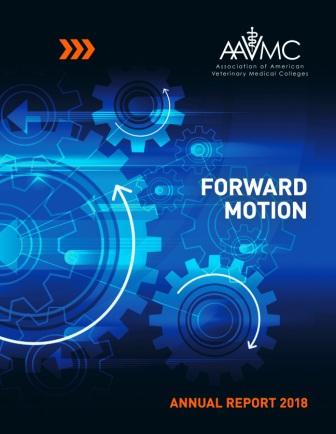 The AAVMC’s 2018 Annual Report has been published. Digital copies are available on the website and multiple print copies to support selected distribution within member institutions will be arriving soon.
The AAVMC’s 2018 Annual Report has been published. Digital copies are available on the website and multiple print copies to support selected distribution within member institutions will be arriving soon.The 20-page report is themed “Forward Motion” and includes updates on major program areas like admissions and recruitment, health and wellness, diversity and inclusion, educational debt and other areas.
Programmatic activity within each of the AAVMC’s enterprise-wide initiatives to Analyze, Catalyze and Advocate are also detailed. The report contains several infographics summarizing key data on application trends, graduation, enrollment and student debt.
The report also contains an annual financial report. Read the report here.
Reminder: Zoetis Student Scholarship Deadline November 28
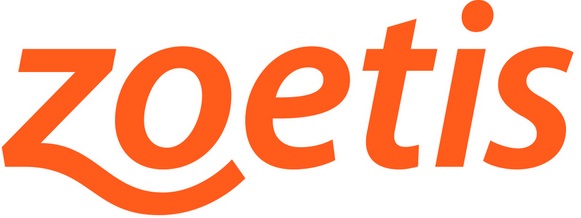 Member institutions are reminded that the student application deadline for the annual Zoetis Veterinary Student Scholarship Award program is November 28, 2018. Click here for detailed application information.
Member institutions are reminded that the student application deadline for the annual Zoetis Veterinary Student Scholarship Award program is November 28, 2018. Click here for detailed application information.The program provides $2,000 scholarships for second- and third-year veterinary students enrolled at colleges and schools in the United States and Caribbean.
The scholarships are awarded based on academic excellence, financial need, diversity, sustainability, leadership and career interest. Scholarships are available to students in all areas of professional interest, including food animal medicine, small animal clinical medicine, research, government services, public health, and organized veterinary medicine.
Now in its 10th year, the Zoetis Veterinary Scholarship program has awarded over 3,000 scholarships totaling over $6 million. Winners will be announced during the 2019 SAVMA Symposium at the University of Georgia March 9-11, 2019.
USAID Awards $15 Million to Mississippi State for Aquaculture Initiative
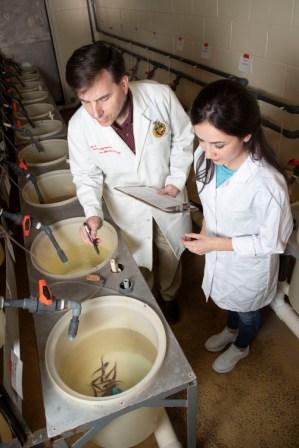 Mississippi State University College of Veterinary Medicine is the recipient of $15 million in funding from the U.S. Agency for International Development (USAID) to establish a Feed the Future Innovation Lab on Fish.
Mississippi State University College of Veterinary Medicine is the recipient of $15 million in funding from the U.S. Agency for International Development (USAID) to establish a Feed the Future Innovation Lab on Fish. Created as part of the bipartisan Global Food Security Act of 2016, the federal government’s “Feed the Future Innovation Labs” leverage the strengths of top U.S. universities in addressing challenges in agriculture, food security and nutrition. There are 24 of the programs.
MSU CVM Associate Dean and Professor Dr. Mark Lawrence will oversee the five-year initiative that is aimed at reducing poverty and improving the health of people in developing countries.
“Faculty in the MSU College of Veterinary Medicine and from several other MSU colleges have for many years been focused on ensuring a safe supply of seafood, and our selection to lead this important initiative comes after a great deal of hard work on the part of many people,” said MSU CVM Dean Kent Hoblet.
In many countries, especially in the developing world, fish and other aquaculture products serve as the main source of inexpensive protein to combat malnutrition and under-nutrition. However, research is needed to fully understand and capitalize on the potential of this valuable commodity, according to a university news release announcing the grant.
The project involves more than veterinary medicine and will integrate the expertise of numerous public and private organizations, research agencies, domestic and international universities, as well as associations within target countries. Experts in fish feed improvement, fish genetics, social science, nutrition, fish production, biosecurity, market access, food safety and capacity will all work together on the project.
The international initiative aims to identify and implement solutions to reduce poverty, as well as improve the livelihood, nutrition and food security in priority areas in countries in Africa and Asia and other developing regions.
The Feed the Future Innovation Lab on Fish (FIL) is part of MSU’s Global Center for Aquatic Food Security, also led by Lawrence, which is dedicated to addressing challenges facing aquaculture and finding solutions to meeting food security needs throughout the world.
Joining these veterinary experts in managing the FIL are faculty members and scientists from universities across the U.S. Current partners include the University of Rhode Island, Washington University in St. Louis, Texas State University, Texas A&M University, and the University of Florida, along with faculty from additional colleges at MSU.
Learn more.
Veterinary Debt Initiative Establishing Program
 The Veterinary Debt Initiative (VDI), an organization that includes representatives from the AVMA, the AAVMC and the Veterinary Medical Association Executives (VMAE), is making progress in several key areas.
The Veterinary Debt Initiative (VDI), an organization that includes representatives from the AVMA, the AAVMC and the Veterinary Medical Association Executives (VMAE), is making progress in several key areas.Dr. Kim Farina has been hired as VDI Project Manager. Farina has experience working with the American Veterinary Medical Foundation’s (AVMF) Partners for Healthy Pets program and other initiatives in veterinary medicine. She has also worked with Hill’s Pet Nutrition in marketing and sales.
The VDI is holding monthly virtual and/or actual meetings and is approaching its work in four specific areas of activity: Get the Word Out, Advocacy, Development of Resources, and Research and Metrics.
The VDI has roots with the former “Fix the Debt Initiative,” but is taking a more opportunistic, strategic approach to addressing the financial aspects of veterinary education and practice.
Their mission is to “educate, advocate and provide leadership to ensure veterinarians can pursue a lifetime of financial success in a personally and professionally rewarding career.”
Click here to read a periodic newsletter which is chronicling their progress.
USAID Plans One Health Workforce Conference on Infectious Disease Threats
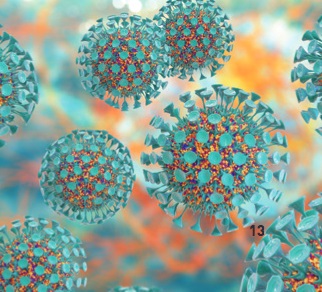 AAVMC member institutions working on the prevention, detection and response to infectious disease threats are invited to consider participating in one of two pre-application conferences being organized by the United States Agency for International Development’s (USAID) Emerging Threats Division. Those conferences will be held on November 29, 2018, in Washington, D.C., and on December 7, 2018, in London.
AAVMC member institutions working on the prevention, detection and response to infectious disease threats are invited to consider participating in one of two pre-application conferences being organized by the United States Agency for International Development’s (USAID) Emerging Threats Division. Those conferences will be held on November 29, 2018, in Washington, D.C., and on December 7, 2018, in London.During the meetings, USAID officials will discuss details of an upcoming Request for Information (RFI) that will solicit stakeholder input on a proposed $85 million “One Health Workforce (OHW) Next Generation” program. The planned program is designed to equip current and future workforces with the multi-sectoral skills and competencies required to more effectively address emerging infectious disease threats.
For almost 10 years, USAID has invested in the development of two regional One Health, university-based networks in Africa and Southeast Asia. The goal: transforming health workforces to function more effectively and across sectors. One Health Central and East Africa (OHCEA) is based in Kampala, Uganda, and Southeast Asian One Health University Network (SEAOHUN), is based in Chiangmai, Thailand.
These networks consist of 144 schools and faculties in 84 universities from 12 countries. Under OHW Next Generation, USAID plans to build on this investment by strengthening the organizational capacity and effectiveness of these two networks.
Registration information is available at www.grants.gov under Opportunity Number 7200AA19RFA00004 or here.
World Veterinary Association Global Animal Health Award Deadline November 19
 Faculty, interns and residents at AAVMC member institutions are invited to apply for one of the World Veterinary Association Global Animal Welfare Awards. The deadline for applications is November 19, 2018. Because applications must be submitted to the WVA by a constituent member association of the WVA, the AVMA is coordinating U.S. and Canadian submissions.
Faculty, interns and residents at AAVMC member institutions are invited to apply for one of the World Veterinary Association Global Animal Welfare Awards. The deadline for applications is November 19, 2018. Because applications must be submitted to the WVA by a constituent member association of the WVA, the AVMA is coordinating U.S. and Canadian submissions.This year, the WVA will be selecting one veterinary student from nominations received from around the world to receive the first WVA Student Animal Welfare Award.
Complete information on nomination procedures and requirements can be downloaded by clicking on the following links: Instructions for AVMA Member Veterinarians and Instructions for SAVMA Members.
Deadline for submission of complete nomination packets to the AVMA is no later than 5 p.m. Central time on Monday, November 19, 2018, which is earlier than the WVA deadline. This allows the AVMA sufficient time to verify that the nomination packet is complete prior to submitting it to the WVA. Nominees will be copied on AVMA’s electronic submission to the WVA.
For more information, contact Dr. Beth Sabin, AVMA director of global outreach, at esabin@avma.org or 847-285-6711.
In the News
These Synthetic Canine Cadavers Help Vets Save Real Dogs
Popular Science
Fight Alzheimer’s Disease with Olive Oil, Auburn University Researcher Says
Daily Heralds
Survey Finds Widespread ‘Moral Distress’ Among Veterinarians
National Public Radio (NPR)
Trials Help Dogs, Humans
Boston Herald
How Hibernators Could Help Humans Treat Illness, Conserve Energy and Get to Mars
Science Daily
Registration Opens for Annual AAVMC Conference
Today’s Veterinary Business
From Vaccinating Pets to Banking, Massachusetts High School Offers Innovative Curriculum
CBS News
Veterinary College is a Popular Choice, Again
Today’s Veterinary Business
Texas Tech Pushes Ahead on Veterinary School
VIN
Researchers to Develop New Stem Cell-based Strategies for Treating Vision Disorders
Medicalnewser
Veterinarians Try to Improve Safety, Efficiency in New Drug Development
Pennsylvania Ag Connection
Dogs Bred and Trained in Alabama on Front Line in War of Terror
WDHN-TV
MU Researchers Study Cat Genomes to Treat Human Allergies
St. Louis Post Dispatch
Veterinary College Could Open Seats for International Students to Address Funding Shortfall
The Star Phoenix
Bats More Likely to Spread Disease When Stressed, Vet College Researchers Find
CTV News
From Our Members
Veterinarian Leads Implementation of International Biobank StandardsCornell
Herman and Connie Soong Commit $10.1 Million to LSU School of Veterinary Medicine, Including Largest Gift in School’s History
Louisiana State University
UC Davis Veterinary Orthopedic Surgeons Regrow Dog’s Leg Bone
UC Davis
LMU Veterinarians Serving Appalachia
Lincoln Memorial
Volcanic Eruption Leads to Transformative Public Health Student Experience
Virginia-Maryland
Learning From Gorillas to Save Killer Whales
UC Davis
People in Motion
Dr. Jon Huxley has become head of the School of Veterinary Science at Massey University in New Zealand.
“Like” us on Facebook or follow us on Twitter:




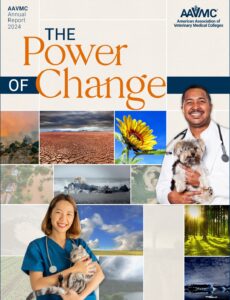
SHARE